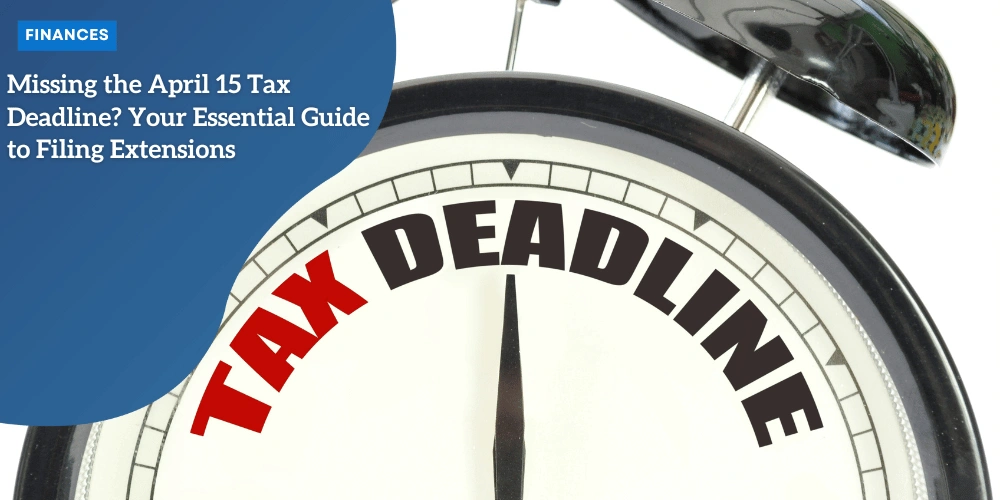Missing the April 15 Tax Deadline? Your Essential Guide to Filing Extensions

Anúncios
Understanding the Tax Filing Deadline
Every year, the IRS sets April 15 as the crucial deadline for U.S. taxpayers to submit their returns.
As midnight approaches in your local time zone, millions of filers rush to meet this date.
The IRS places great importance on this deadline for timely filing to ensure the tax system operates smoothly and efficiently.
Mail and Electronic Filings
For those who prefer mailing their tax returns, the return must be postmarked by April 15.
Anúncios
This means that even if the IRS receives your return after the deadline, as long as your envelope bears the postmark, you should be in the clear.
On the other hand, if you’re submitting your tax return electronically, whether through tax software or online platforms, the submission must be completed by midnight on April 15 in your local time zone to avoid penalties.
Importance of Timely Filing
Timely filing is not just about meeting a formal deadline.
It’s crucial for avoiding penalties that the IRS imposes for late submissions.
These penalties can add unneeded financial stress and complicate your financial planning.
Anúncios
Moreover, if you are due a refund, submitting on time means you’ll receive your money sooner.
Conversely, if you owe taxes, filing promptly can help in managing and settling your tax liabilities efficiently.
Now that you understand the significance of April 15, it’s wise to start preparing well in advance.
This will help avoid last-minute hiccups and ensure a smooth tax filing experience.
When to Consider a Tax Extension
Sometimes, meeting the April 15 tax filing deadline can be challenging, and that’s where considering a tax extension comes into play.
Extensions give you more time to get everything in order, and can be especially helpful in complex situations.
Complex Tax Situations
Complicated financial situations, such as running a business, dealing with investments, or having significant deductions, might require more documentation than you can gather by the regular deadline.
Making sure everything is accurate can be a painstaking process, and an extension helps you avoid errors and potential audits.
Busy Tax Professionals
Tax season is a busy period for tax professionals.
If you work with an accountant or a tax preparer, they may opt to file an extension on your behalf.
This allows them ample time to give each client’s return the attention it deserves, decreasing the chance of mistakes.
Incomplete Paperwork
If essential paperwork is missing, perhaps due to waiting on W-2 forms, 1099s, or other financial documents, filing an extension buys you needed time.
Having all documentation on hand is crucial for an accurate tax return.

Complicated Financial Situations
Life happens, and sometimes you find yourself in complex financial landscapes.
Whether it’s dealing with multiple income streams, assets, or significant life changes like divorce or inheritance, these scenarios can complicate the filing process.
An extension can offer relief, making sure you don’t rush through important details.
Remember, while an extension grants more time to file, it does not extend the payment deadline.
You still need to estimate and pay any owed taxes by April 15 to avoid penalties and interest charges.
Knowing when to consider a tax extension is vital for effectively managing your tax obligations and avoiding stress.
How to Request a Tax Extension
Using Form 4868
Requesting a federal tax extension is simpler than you might think.
The key form you’ll need is Form 4868, which is officially titled the “Application for Automatic Extension of Time To File U.S. Individual Income Tax Return.“
This form can be easily found on the IRS website and must be submitted by the original filing deadline of April 15.
Electronic Submission
While you can mail in Form 4868, electronic submission is strongly recommended.
The IRS has faced significant delays in processing mail due to reduced staff and increased demand.
By submitting the form electronically, you guarantee prompt processing of your request and receive confirmation of your extension.
Additional Filing Time, Not Payment Time
It’s crucial to understand that a filing extension does not give you more time to pay your taxes.
You still need to estimate and pay any taxes owed by the original April 15 deadline to avoid penalties and interest.
The extension only provides extra time to complete your paperwork, not to defer payment.
Properly navigating the process of requesting a tax extension can save you from potential headaches and financial penalties down the line.
When dealing with taxes, preparation is key. Stay organized, and if necessary, seek professional advice to ensure you’re on the right track.
Important Considerations for Extended Filing
Filing a tax extension might relieve some pressure, but paying the IRS on time remains crucial.
Here’s what you need to know about managing taxes if you decide to file for an extension.
Payment Deadline Stays the Same
Even if you file a tax extension, you must still pay any owed taxes by April 15.
An extension only grants more time to complete your paperwork, not to make your payment.
Missing the payment deadline can lead to penalties and interest, so it’s essential to handle this promptly.
Estimate and Pay Taxes Due
If you expect to owe taxes, you must make an estimated payment by the original deadline.
This helps you avoid penalties and accrued interest on your debt.
The IRS has guidelines to assist with calculating your estimated taxes, ensuring you stay as accurate as possible.
Remember, it’s better to overestimate slightly than underestimate and face unexpected costs later.
Focus on Paperwork
The additional time granted by an extension should be used wisely to dot your i’s and cross your t’s.
Completing your documentation thoroughly can help you avoid errors that might trigger audits or delays in processing.
Gather all relevant statements, receipts, and any other documents needed to file a complete return.
By moving forward with these considerations in mind, you can manage the pressures of tax season effectively.
Stay ahead of deadlines and ensure you meet requirements without unnecessary stress.
Special Deadline Extensions for Natural Disaster Areas
Natural disasters can disrupt lives and routines, making it challenging for affected taxpayers to meet deadlines.
Recognizing the need for flexibility, the IRS offers special accommodations and deadline extensions for residents and businesses in areas impacted by severe weather and other disasters.
Automatic Extensions for Specific States
In 2023, states such as Tennessee, Arkansas, and Kentucky faced severe weather events that led to the IRS providing automatic extensions for tax filing.
This means that residents and businesses in these states will have additional time to complete their tax returns without the need to request an extension formally.
The extended deadlines can range from 60 to 120 days, depending on the extent and nature of the disaster.
IRS Accommodations
The IRS aims to ease the burden on disaster victims by granting extensions and ensuring they have sufficient time to organize their financial documentation, especially when more pressing issues like property damage and loss of income are at the forefront.
These accommodations help affected taxpayers avoid penalties and interest that might otherwise result from missing the original filing deadline.
Checking State-Specific Deadlines
It’s essential for those in disaster-impacted areas to verify their state-specific deadlines.
The IRS typically announces these extensions and affected regions through their website and various news outlets.
This will provide the most accurate and timely information needed to ensure compliance with any new deadlines.
Although not explicitly previewing the next segment, understanding these provisions can help taxpayers in affected areas manage their tax responsibilities without added stress during difficult times.






